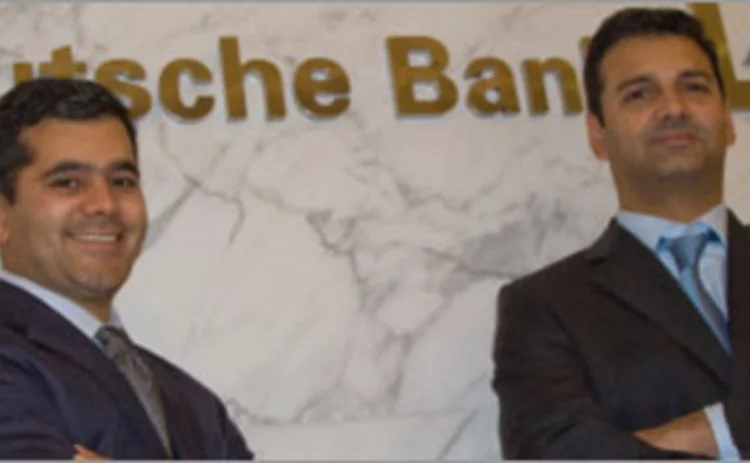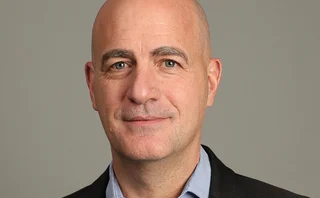
Currency Derivatives House of the Year - Deutsche Bank

Any timeline of 2008 can be neatly split into two phases: pre- and post-Lehman. Before the failed broker-dealer filed for Chapter 11 bankruptcy protection on September 15, the foreign exchange market had held up relatively well to the stresses and strains of the crisis that had swept through the credit market. Investors were still showing interest in the variety of foreign exchange indexes touted by banks, despite the poor performance of the carry trade, while corporate treasuries were keen to consider complex derivatives structures to reduce the cost of their hedges.
Post-September 15, priorities - and market conditions - changed. Financial markets were hit by unprecedented levels of volatility, liquidity for certain products evaporated and market participants zeroed in on counterparty credit risk, with some shying away from those dealers perceived to be most at risk. In the difficult weeks immediately following Lehman, a lack of visibility caused many dealers to temporarily pull prices from their screens, particularly for foreign exchange options. Some all but withdrew from quoting on certain currencies. No more than a couple continued to quote prices on both screens and by voice - albeit with wider bid/offer spreads. Among them, Deutsche Bank wins plaudits from clients for its presence, breadth of offering across G10 and emerging market currencies, and the help given to clients during the stormy weeks of late September.
"This year, especially during September and October, Deutsche Bank is the one that really does stick out. From my point of view, they are by far the best liquidity provider in the market," comments one London-based forex broker.
"We took the decision to deal primarily with Deutsche Bank during the week following Lehman Brothers to reduce the possibility of counterparty risk," remarks a London-based hedge fund manager. "I had a good dialogue with them during that week to get regular updates on what was going on."
The revelation that Lehman had filed for bankruptcy protection on September 15, after weekend talks to find a buyer failed, sent the derivatives market into overdrive, as banks rushed to close out positions and former Lehman clients scrambled to replace hedges. Many dealers - particularly those with commercial banking arms - reported a surge in volumes in the two weeks following the failure, from both former Lehman customers and clients of other investment banks felt to be at risk of collapse.
Having closed out its own risk by the morning of September 15, Deutsche Bank turned to assist clients, offering liquidity and help to those confused by the complex legal structure of Lehman. "We took them through the thought processes of how to think about and analyse what contracts they still had on, which contracts they didn't, how those contracts would be settled, where they still had risk, and whether or not they still had a hedge on," comments Rashid Hoosenally, global head of foreign exchange structuring at Deutsche Bank in London. "We had gone through that process internally and identified all the legal entities and issues, and were able to recycle that internal expertise and apply it to clients."
While credit default swap spreads on some rivals ballooned during September and October, the cost of protection on Deutsche Bank remained relatively steady, rising from 88.7 basis points at the close on August 29 to 170bp on September 17. That compares with 327.5bp for UBS, 231.7bp for Barclays and 221.7bp for Royal Bank of Scotland on September 17. As a result, the German bank saw a significant increase in flows as counterparty credit concerns reached a crescendo, with volumes on its electronic platform rising 28% between the week of September 1 and the week commencing September 15.
"We were quoting currencies to our clients electronically when many of our competitors switched off. We were quoting by voice and still quoting in the options market in the aftermath. Consequently, we saw a rise in volumes from already record levels," comments Zar Amrolia, global head of forex in London.
Amrolia attributes the ability to continue quoting electronically in difficult market conditions to a real-time risk system the bank implemented in 2007. "Having a system to stress test and do market scenarios in the options market was critical. People refused to quote because they didn't understand what their risks were. They would run the risks overnight, which was useless because the market was moving so much," he explains. "We invested in a stochastic volatility model in 2007, which puts a lot of emphasis on the various behaviours between spot, volatility and skew under different real-time scenarios, and that was key."
While much of the attention before Lehman was on indexes, forex-linked exchange-traded funds and cost-reduction strategies for corporate treasurers, the focus has now completely shifted. The high volatility environment means protection is first and foremost on the minds of participants. Hoosenally expects clients will now be more willing to pay premium for protection, rather than sell volatility to enhance returns or reduce hedging costs. Indeed, the bank is now encouraging its clients not to leave trades open ended and to cap potential losses, even if that means paying premium upfront or giving away some potential upside to pay for the option.
"People have had a wake-up call and realised credit is a precious commodity," says Hoosenally. "We don't have an infinite amount of credit for our clients following the Lehman bankruptcy. And our clients have realised it applies to them too - they don't have infinite credit appetite for their banks. So more clients are willing to enter into credit support annexes or put in place some sort of mark-to-market protection. We have been on the front foot pushing this to clients."
While this has come very much to the fore in the wake of Lehman, some of the themes were apparent before September 15. For instance, Deutsche worked with a US private equity firm earlier in 2008 that had a portfolio of European assets. The strengthening of the euro had created additional returns for the firm, which the bank felt made sense to lock in. After months of discussion with the investor and analysis of its portfolio, it was decided the best solution was to buy put options on euro/dollar.
While the solution was simple, the process behind it was more complex. As a private equity firm, its funds were tied up in physical assets, meaning there wasn't cash available to pay the option premium. As such, it was decided to defer premium, but this created a credit exposure for Deutsche Bank. A simple guarantee would have had onerous tax implications, so a structure had to be found that did not breach internal rules or expose investors to unrelated business-taxable income.
The end solution involved portfolio analysis and option trading, as well as tax, legal and accounting expertise. These themes are likely to be more prevalent in 2009, reckons Amrolia. "There is no doubt in my mind that foreign exchange is going to be one of the key risks companies face in 2009, just because of the nature of the volatility. However, you don't need complex products. What you need is smart views, smart solutions and a smart understanding of corporate needs and the effect on the company. So we see that trend continuing - simpler products but in a more complex environment."
That's not to say all forex-linked investment products are dead in the water. In particular, Deutsche Bank has seen strong growth in its FX Select platform, a managed account platform comprising 68 forex hedge fund managers. One of the primary advantages is that the platform offers daily liquidity - a major boon in the past few months.
"Our experience of investing in the FX Select platform has been good. It offers 24-hour liquidity, so we can redeem very quickly. It is by far the biggest platform with pooled forex programmes," says one Switzerland-based asset manager.
The platform now has around $3 billion in assets, up from approximately $1 billion at the start of the year. Returns have also been positive. The average annualised return of the forex managers on the platform (above Libor, net of all fees) was 2.09% in the year to November 28. However, the average return after the Lehman collapse was 6.03% compared with 1.68% in the year to September 12. All the macro managers on the platform (those that trade forex and liquid exchange-traded futures) made positive returns, with an average of 29.7% in the year to November 28.
"FX Select has performed well during the crisis. Liquidity and transparency have gone rocketing up the agenda for all investors in the past couple of months, so we expect to see more interest in the platform in 2009," says Hoosenally.
The next year, however, is likely to bring a raft of regulatory changes and improvements in infrastructure. There has been plenty of talk about central clearing houses in the credit default swap market, and attention is likely to turn to other asset classes, including foreign exchange. Meanwhile, regulators in Brazil and Mexico are looking closely at losses racked up by domestic corporates using foreign exchange derivatives (Risk November 2008, pages 60-61). In particular, attention has focused on target redemption forwards. A large number of banks, including Deutsche Bank, sold these products to corporates in the region and, in some cases, are caught up in legal disputes. Deutsche is thought to be less exposed than some, but all banks are likely to be giving their processes and controls a close look in 2009.
Only users who have a paid subscription or are part of a corporate subscription are able to print or copy content.
To access these options, along with all other subscription benefits, please contact info@risk.net or view our subscription options here: http://subscriptions.risk.net/subscribe
You are currently unable to print this content. Please contact info@risk.net to find out more.
You are currently unable to copy this content. Please contact info@risk.net to find out more.
Copyright Infopro Digital Limited. All rights reserved.
You may share this content using our article tools. Printing this content is for the sole use of the Authorised User (named subscriber), as outlined in our terms and conditions - https://www.infopro-insight.com/terms-conditions/insight-subscriptions/
If you would like to purchase additional rights please email info@risk.net
Copyright Infopro Digital Limited. All rights reserved.
You may share this content using our article tools. Copying this content is for the sole use of the Authorised User (named subscriber), as outlined in our terms and conditions - https://www.infopro-insight.com/terms-conditions/insight-subscriptions/
If you would like to purchase additional rights please email info@risk.net
More on Awards
Joining the dots: banks leverage tech advancements for the future of regulatory reporting
The continued evolution of regulatory frameworks is creating mounting challenges for capital markets firms in achieving comprehensive and cost-effectiveawa compliance reporting. Regnology discusses how firms are starting to use a synthesis of emerging…
Markets Technology Awards 2024 winners' review
Vendors spy opportunity in demystifying and democratising – opening up markets and methods to new users
Derivatives house of the year: JP Morgan
Risk Awards 2024: Response to regional banking crisis went far beyond First Republic
Risk Awards 2024: The winners
JP Morgan wins derivatives house, lifetime award for El Karoui, Barclays wins rates
Best product for capital markets: Murex
Asia Risk Awards 2023
Technology vendor of the year: Murex
Asia Risk Awards 2023
Best structured products support system: Murex
Asia Risk Awards 2023
Energy Risk Asia Awards 2023: the winners
Winning firms demonstrate resiliency and robust risk management amid testing times
Most read
- Top 10 operational risks for 2024
- Top 10 op risks: third parties stoke cyber risk
- Japanese megabanks shun internal models as FRTB bites







